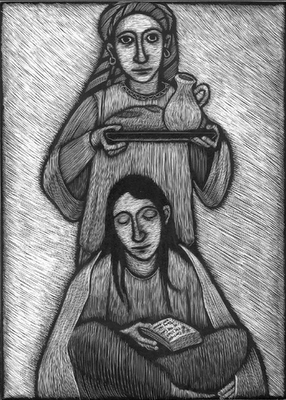Jijo Kandamkulathy, CMF
Claretian Publications, Macau
16TH SUNDAY – C
Lk 10:38-42
Marthas and Marys have rarely patched up in history nor have the Cains and Abels. Sibling rivalry is a cruel gene devised by evolution. Golden eaglets are known to push the waiting-to-be-hatched eggs out of their nests, sometimes even the hatched siblings! Some start it even earlier, like sand sharks. There are two wombs in a mother shark and many embryos in each. But only one shark pup will emerge in birth from each. The survivors will have have eaten the other embryos in utero. These examples do not excuse the hatred that people hold against their siblings.
The Gospel tells us about Martha complaining that she was left to do all the household chores while Mary sat and listened to Jesus. Martha spews her complaints about Mary in front of the guest. Sibling rivalries rarely play out in front of guests. If they do, they must have become bad enough for it to happen. The stories in the Bible about sibling rivalry are often about fighting for attention. Cain was sad because Abel’s offering was accepted by God and his was rejected. He removed Abel from the scene so that God would have no choice but to accept Cain’s offering. He wanted to forcefully get God’s attention.
The story of Jacob and Esau is also presented as sibling rivalry. In this case, Jacob starts it even as he was in the womb! Their mother favors one child, while the father favors the other. The treachery in the family grows to an extent that the celebrated father of Israel (Jacob) appears lacking in goodness vis-à-vis the generous older brother, Esau. The story of Joseph being sold to the Egyptian businessmen is because of the jealousy that arose due to the other brothers not enjoying the same attention that the father gave to Joseph. Sibling rivalry often begins with the fear that parental attention is a rare commodity that must be acquired by any means possible and prevented from spilling over to other siblings. The story of Rachel and Lea is not different either. They fought for the attention of their husband. The brothers in the prodigal son’s story once again brings to our consciousness the rivalry of the siblings. The presumed shortage of attention is often at the root of such sibling rivalry. There is a self-preservation instinct, an inborn trait that keeps a watchful eye for siblings who might get more attention.
There is also the case of mimetic desire. It is not exactly that I do not have enough, but that I unconsciously desire what the other siblings desire. This was the case with Martha. While she was busy working, she desired (envied) Mary’s pursuits at the feet of Jesus. There was nothing wrong in Martha doing the household chores. Jesus would have appreciated her had she waited long enough. But she had already started desiring Mary’s position. If Mary was not there, Martha would have happily done her chores.
There is a need to develop reflective thinking on the unconscious motivations of our behaviors. Before reading further, it would be rewarding to look back and recall childhood rivalries that we developed with our siblings and how irrationally we have carried them to an advanced age! Jesus gives an antidote to this evolutional anomaly. The comment of Jesus to Martha was simple. You are worried about many things. Martha had one job at hand and was worried about the job of her sister. Mary is praised because she was free from the mimetic desire of Martha for what Mary was doing. Her mind was on what she was doing and not what Martha was doing.
If the choice to do some particular work is a conscious one, that choice is backed up by its own reasons. If we do not rely on those reasons, it is most likely that we get caught up with mimetic desires and envy. One needs to learn the art of being comfortable in one’s own shoes. Buddha seems to have stated this fundamental principle of human life, “Desire is the cause of all evil.” It is not about not having any desire: without any desire for good things in life, people drift into depression. The reference is more suitable to mimetic desires. Each one of us is a unique person, and desiring the uniqueness of others, is to negate one’s own uniqueness and potential. We need not, we should not mimic others. One person is enough for one’s kind! Let Marthas be Marthas and Marys be Marys.


 Follow
Follow


